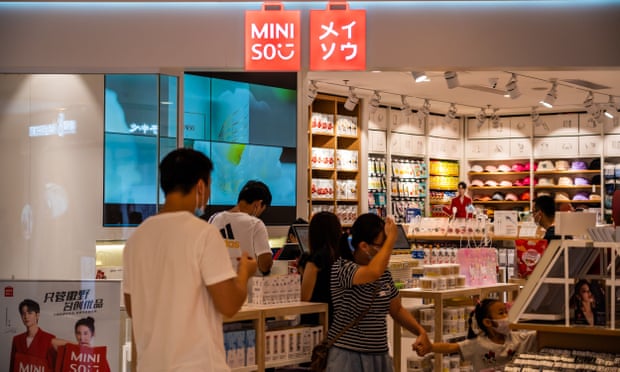Miniso Group’s Stock Dips Following Acquisition Plans: A Risky Move into the Supermarket Sector?
Miniso Group’s recent announcement of its plans to acquire a stake in Yonghui Superstores, a prominent Chinese supermarket chain, has sent shockwaves through the stock market. Investors reacted swiftly, leading to a notable drop in Miniso’s share price, as questions arose regarding the strategic value and potential risks of the deal. Miniso, known for its affordable lifestyle products, is now eyeing a move into the grocery and supermarket sector, a shift that has left its investor base wary of the potential outcomes. The reaction underscores the complexities and challenges involved when companies venture into unfamiliar territory.
The Acquisition: A Strategic Shift for Miniso
Miniso, a global retailer that has built its brand by offering budget-friendly lifestyle goods, announced its decision to invest in Yonghui Superstores, one of China’s leading supermarket chains. This acquisition marks a significant departure from Miniso’s core business model, which has traditionally focused on selling affordable home goods, beauty products, toys, and electronics.
The motivation behind the acquisition seems clear: Miniso is looking to diversify its revenue streams by tapping into the grocery market, a sector that offers consistent demand but operates on thin margins. In recent years, the supermarket industry in China has seen fierce competition and shrinking profit margins, driven by both traditional brick-and-mortar competitors and e-commerce platforms. Despite these challenges, Miniso’s move signals its ambition to expand its footprint and adapt to changing market conditions.
However, while diversification can present opportunities for long-term growth, it also comes with risks, especially for companies venturing into sectors where they have limited experience.

Market Reaction: Investor Concerns and Stock Price Decline
The announcement of the acquisition triggered an immediate response in the stock market, with Miniso’s shares experiencing a sharp decline. Investors expressed concern over the deal, viewing it as a risky and potentially costly move that could divert focus from Miniso’s core business.
One of the primary reasons for the negative reaction is the supermarket sector’s inherently low margins. Supermarkets operate in a highly competitive environment, with thin profit margins and substantial operational challenges, including supply chain management, inventory control, and high capital expenditures. Investors fear that by entering this competitive landscape, Miniso may be spreading itself too thin, thereby compromising the efficiency and profitability of its lifestyle business.
The drop in Miniso’s stock price reflects broader concerns about how the company plans to manage the integration of Yonghui Superstores into its operations. Investors are also wary of the potential financial implications, particularly with regard to debt levels and cash flow. If the acquisition requires significant capital outlay or leads to an increase in debt, Miniso’s financial stability could be put at risk, especially if the supermarket business fails to deliver the expected returns.

Key Investor Concerns: Business Diversification Risks
The negative reaction to the acquisition is rooted in several concerns related to Miniso’s diversification strategy:
1. Brand Dilution: Miniso has established itself as a go-to destination for cost-effective lifestyle products. Shifting into the grocery sector could dilute its brand image and create confusion among its customer base. The challenge lies in maintaining Miniso’s appeal as a lifestyle retailer while also managing the complexities of running a supermarket business.
2. Operating Margins: The grocery business operates on thin margins, which could negatively impact Miniso’s overall profitability. Investors are concerned that the company may struggle to maintain its current growth trajectory if the supermarket business fails to generate strong returns.
3. Financial Health: The acquisition could lead to an increase in debt or strain Miniso’s cash flow, particularly if significant upfront investments are required to acquire and integrate Yonghui Superstores. If the supermarket business underperforms, it could have a cascading effect on Miniso’s financial performance, including liquidity and leverage ratios.

Long-Term Potential and Strategic Benefits
While the immediate reaction from investors has been negative, there are potential long-term benefits to Miniso’s acquisition of a stake in Yonghui Superstores.
1. Revenue Diversification: By entering the grocery sector, Miniso has the opportunity to diversify its revenue streams. The supermarket business, though low-margin, offers consistent demand and could help stabilize Miniso’s performance during economic downturns when discretionary spending on lifestyle products may decline.
2. Cross-Selling Opportunities: Yonghui Superstores provides Miniso with an existing network of supermarket locations across China. Miniso could leverage this network to cross-sell its lifestyle products within Yonghui’s stores, creating synergies between the two businesses. By integrating its home goods, beauty products, and electronics into Yonghui’s supermarkets, Miniso could expand its customer base and strengthen its presence in the retail market.
3. Market Penetration: If executed successfully, the acquisition could position Miniso to tap into new markets and customer segments. Yonghui’s expertise in the supermarket business could also provide valuable insights into consumer behavior, supply chain management, and operational efficiencies, all of which could benefit their broader business strategy.
Conclusion: A Risky but Potentially Rewarding Move
Miniso’s decision to acquire a stake in Yonghui Superstores has undoubtedly raised concerns among investors, as reflected in the sharp drop in its share price. The move into the highly competitive and low-margin supermarket sector presents significant risks, particularly with regard to their brand identity, operating margins, and financial health.
However, the acquisition also offers potential long-term benefits through revenue diversification, cross-selling opportunities, and market expansion. If they can successfully integrate Yonghui Superstores into its broader business strategy, it could emerge as a more resilient and versatile company capable of navigating economic challenges.
For now, investors will need to closely monitor their financial performance and the execution of its acquisition strategy. The success of this venture will depend on their ability to manage the complexities of the supermarket business while continuing to deliver value in its core lifestyle product offerings.

